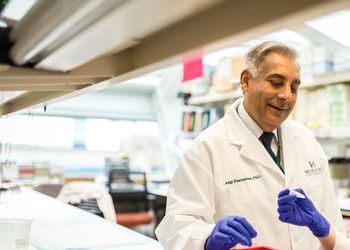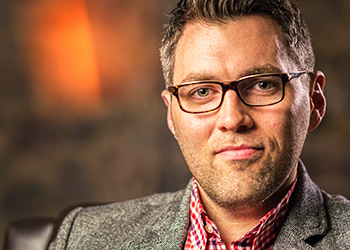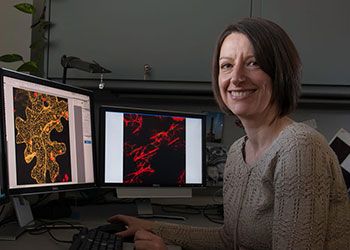Unique Strengths Work Together for Positive Change
Support world-changing research like Felicia Wu's
Unique Strengths Work Together for Positive Change
Support world-changing research like Felicia Wu's
November 23, 2015Researcher Felicia Wu is a self-professed food lover.
“I love food, which has caused me to become very interested in how human health is affected by the food we produce and how we produce it,” Wu said. “And Michigan State University is a fantastic collaborative environment for this work.”
Wu, the Hannah Distinguished Professor of Food Science and Human Nutrition and Agricultural, Food and Resource Economics at MSU, is a global food safety and security expert in the College of Agriculture & Natural Resources who studies how agricultural production, innovation and practices impact human health.
As new food technologies, climate change and the availability of natural resources continually come into question, Wu’s work becomes that much more pressing.
Improving health worldwide
Fungal toxins on foods, or mycotoxins, naturally contaminate food supplies. Wu’s research focuses on aflatoxin, the most toxic of the known mycotoxins. Aflatoxin is most commonly found in corn, peanuts and tree nuts in warmer regions of the world.
Aflatoxin damages the health of potentially billions of people, particularly in places where food is not regulated. It can cause acute liver failure in humans and animals at high doses, and is known to cause liver cancer in humans at lower, chronic doses.
Wu also conducts research on how insects that attack crops develop resistance to pesticides, and how different irrigation schemes may contribute to malaria risk in global populations.
Coming to MSU in 2013 from the University of Pittsburgh, Wu immediately dug into her work on food safety issues and agriculture—and the unintended environmental consequences of both. Wu applies agricultural solutions to human health and food security problems around the world, and says she was attracted to MSU’s unique blending of three strong medical colleges and world-class agricultural research.
“Our barriers are primarily related to there being so many problems to solve at the nexus of agriculture and human health, and simply wanting to have the chance to tackle as many as possible,” Wu said. “So it's a problem of time and of personnel, having enough resources to do all the work.”
From farm to table
In 2014, Wu founded the Center for the Health Impacts of Agriculture (CHIA), a center devoted to answering these massive global questions. Currently, the center is funding a team of researchers to examine problems such as antibiotics given to livestock and poultry that seep into the soil and nearby bodies of water. The group is tracing the antibiotics from the farm to the table and examining how the antibiotic resistant bacteria and antibiotic resistance genes travel in the environment and ultimately reach humans.
Wu says one of the goals of the center is to establish MSU as a go-to place for expertise on the human health effects of agriculture; which can in turn position MSU very well in terms of federal funding.
Like many researchers at MSU, funding takes time to secure and is a competitive landscape, with many vying for the same grant money. Wu has received federal funding from the United States Department of Agriculture, the Bill and Melinda Gates Foundation and the National Institutes of Health, but acknowledges that sometimes it takes a boost from private funding to get to get over the next research hurdle or recruit talented teams.
“Private funding would allow us to fund more research teams at MSU who are doing this work,” Wu said. “So that they can get the results they need, to obtain extramural funding and do research that is crucial to improving livelihoods worldwide.”
And really, what could be greater than this?
Learn more about supporting MSU’s work to solve global problems.
Author: Sarah Wardell



